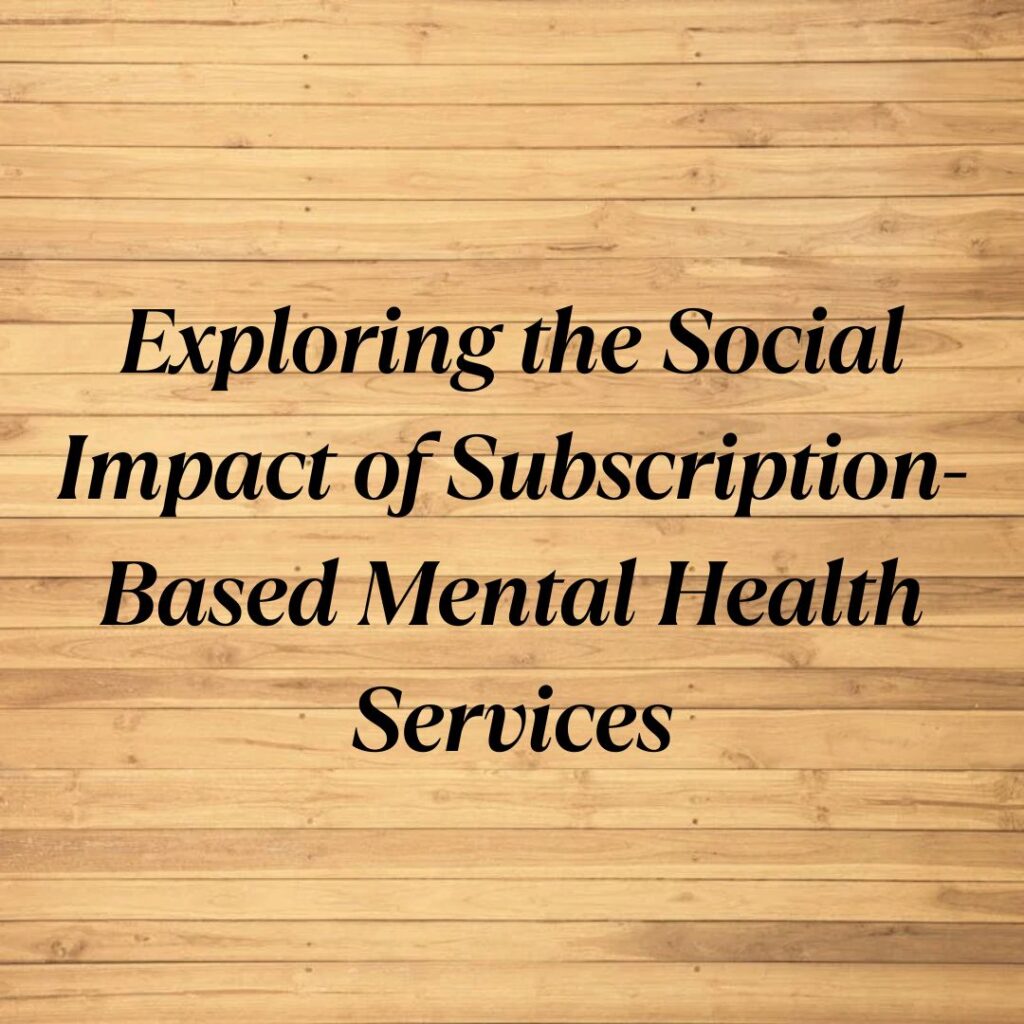In recent years, mental health services have undergone a transformative shift, moving beyond traditional therapy sessions to embrace digital platforms and subscription-based models. This evolution reflects a broader societal recognition of the importance of mental well-being and accessibility to support services. Subscription-based mental health services offer convenience, affordability, and often, anonymity, catering to a diverse audience seeking flexible solutions amidst increasingly hectic lifestyles.
The Rise of Subscription-Based Mental Health Services
The advent of subscription-based mental health services marks a significant departure from the conventional in-person therapy model. Platforms like BetterHelp, Talkspace, and Calm have gained popularity by offering therapy sessions, meditation resources, and personalized mental wellness plans accessible via smartphones or computers. This accessibility is crucial in a world where time constraints and stigma surrounding mental health can deter individuals from seeking help.
Accessibility and Affordability
One of the most profound impacts of subscription-based mental health services is their ability to democratize access to mental health care. In many regions, traditional therapy can be prohibitively expensive or geographically inaccessible. Subscription models eliminate these barriers by offering affordable plans and the flexibility to connect with licensed therapists from anywhere with an internet connection. This approach has been particularly beneficial in rural areas and underserved communities where mental health resources are scarce.
Tailored Support and Personalization
Personalization is another key feature of subscription-based mental health services. These platforms use algorithms and user input to match individuals with therapists or wellness resources that best fit their needs. This tailored approach enhances the efficacy of interventions by addressing specific concerns ranging from anxiety and depression to stress management and sleep disorders. Users often report feeling more empowered in managing their mental health as they receive guidance that resonates with their unique circumstances.
Anonymity and Reduced Stigma
The anonymity offered by digital platforms plays a pivotal role in reducing the stigma associated with seeking mental health support. Many individuals feel more comfortable discussing sensitive topics or exploring therapy options online, away from the perceived judgment or scrutiny they might face in traditional settings. This confidentiality encourages open dialogue and proactive engagement with mental health care, fostering a healthier societal attitude towards psychological well-being.
Integration with Daily Life
Subscription-based mental health services integrate seamlessly into users’ daily routines, aligning with the digital habits prevalent in modern society. Whether through guided meditation sessions during commutes or asynchronous messaging with therapists during lunch breaks, these services adapt to users’ schedules rather than imposing rigid appointment times. This flexibility not only enhances convenience but also encourages consistent engagement with mental wellness practices, promoting long-term benefits.
Social Impact and Community Support
Beyond individual benefits, subscription-based mental health services contribute to a broader social impact by fostering virtual communities and support networks. Online forums, group therapy sessions, and shared experiences create spaces where individuals can connect, empathize, and learn from one another’s journeys. These communities cultivate a sense of belonging and solidarity, combating feelings of isolation that often accompany mental health challenges.
Challenges and Considerations
While subscription-based mental health services offer numerous advantages, they are not without challenges. Concerns about the quality of care, security of personal data, and the effectiveness of remote therapy remain valid considerations. Regulatory frameworks continue to evolve to address these issues and ensure that digital mental health services maintain high standards of ethics and professionalism.
Looking Ahead: Future Directions
The future of subscription-based mental health services appears promising, with ongoing advancements in technology and therapeutic approaches. Innovations such as artificial intelligence-driven therapy bots, virtual reality-based interventions, and data analytics for personalized treatment plans hold potential for further enhancing the efficacy and accessibility of mental health care. As these technologies mature, they are likely to reshape how individuals perceive and engage with mental wellness in the digital age.
Conclusion
Subscription-based mental health services represent a progressive step towards democratizing mental health care, offering accessible, personalized support that adapts to modern lifestyles. By leveraging technology to overcome barriers of cost, stigma, and accessibility, these platforms empower individuals to prioritize and manage their mental well-being proactively. As societal attitudes towards mental health continue to evolve, subscription-based models are poised to play a pivotal role in promoting a culture of holistic wellness and support.
In summary, the social impact of subscription-based mental health services extends far beyond individual therapy sessions, influencing how society perceives and addresses mental health in the 21st century.






